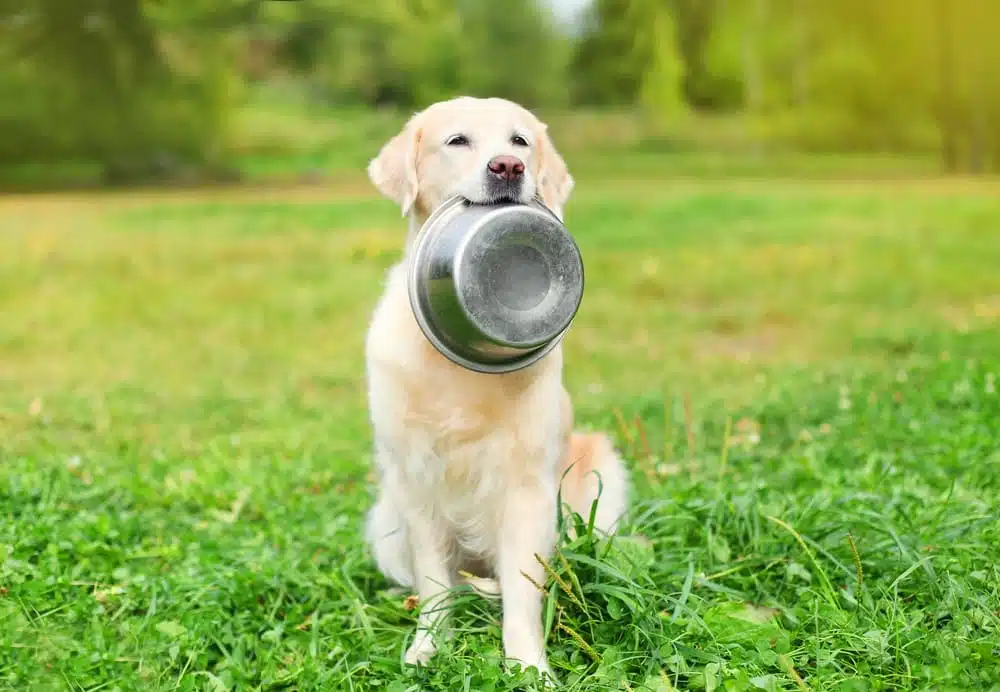
Inflammatory Bowel Disease in Dogs
Having a sick pet is never fun. When you see your dog in pain or suffering from an illness, all you can think about is how to help them feel better. You can be the best owner to your dog. You feed them a nutritious dog food, take them for their daily walks, and give them lots of love and yet they can still get sick. Unfortunately, dogs can’t tell us how they’re feeling, so diagnosing the problem can be difficult.
For a preliminary at-home assessment, the two symptoms of IBD in dogs that clue you into their ailment are what’s coming out of them and where. Vomit signals problems with the stomach while diarrhea signals problems with the small and large intestine. Inflammatory bowel disease (or IBD) can come with one or both of these symptoms. If either of these symptoms is chronic or persist beyond 48 hours, talk to your local veterinarian.
What is IBD?
Despite its name, inflammatory bowel disease in dogs is not technically a disease. IBD is considered a reaction to an underlying cause, making it a symptom rather than a disease itself. Unlike a viral infection like the stomach flu where the immune system can target and fight a specific virus, IBD is a reaction to irritation in the digestive tract.
If this irritation occurs in the stomach, IBD will present as vomiting. If the irritation moves beyond the gut, IBD will present as canine diarrhea .
Inflammatory Bowel Disease in Dogs Symptoms
As pet parents, we can usually tell when our dogs are not themselves or feeling under the weather. There’s usually something off about the way they act or behave. Maybe they’re more sluggish than usual. Or maybe they’re reluctant to eat. These are signs that something may be off. It is critical to note when you first observed the change and behavior and then monitor how long it continues.
However, when it comes to IBD, not all dogs present visible signals. Though internally they are suffering, their excited and happy nature disguises this until the IBD shows up as chronic vomiting and diarrhea.
Here is a full list of possible symptoms of IBD in dogs:
- Chronic vomiting and/or diarrhea
- Fatigue
- Depression
- Constant flatulence or gas
- Blood in the stool
- Persistent rumbling sound in the stomach
- Weight loss
- Clumps of shedding
How Does IBD Occur?
There isn’t a single cause of inflammatory bowel disease, at least not one that doctors can physically point to. It’s one of the reasons IBD isn’t considered a disease unto itself. The factors at play are genetics, diet and food allergies, immune system abnormalities, bacteria, and parasites.
Narrowing down the cause depends on which treatments work. It’s a trial and error technique that unfortunately leaves some dogs with few viable solutions.
Genetics
Genetics might play a key role in the development of IBD in the GI tract. There are serious illnesses—autoimmune, cancer, etc.—which depend on groups of individual genes that can “turn on or off” based on environmental, dietary, and developmental factors. Medical scientists have discovered links between genetics and IBD in humans, but the same research hasn’t been replicated in dogs.
One study published results of canine breeds that were more susceptible to IBD based on previous veterinarian records. The breeds listed as having a significantly higher risk were:
- Weimaraner
- Rottweiler
- German shepherd
- Border collie
- Boxer
While this does suggest genetics do play a role, the direct link remains inconclusive.
Diet and Food Allergies
As alluded above, knowing the underlying cause of IBD depends on whether or not a treatment works. If changing to a diet with few select ingredients cures the dog of these symptoms, then diet may be the underlying cause.
However, IBD is pernicious. Because it is a natural bodily response, it should be noted that you can’t technically “cure” IBD, only to manager or contain it. “Curing” IBD involves eliminating the thing that is causing the irritation. In most cases, this involves changing diets and removing allergens.
Problems with Changing Diets
While changing your dog’s diet might be necessary, that doesn’t mean it will be easy. Here are some problems to keep in mind when attempting a diet change for canines.
- Changing diets too quickly – Kibble was invented as a way to pack together all the necessary vitamins, minerals and nutrients a dog needs and to offer consistency and predictability within their diet. If you feed a dog the same meal twice a day at the same time, you know you’ll be picking up after dog poops with similar regularity or frequency. Dog’s digestive tracts become used to this and changing a diet too quickly can cause the GI tract to go into Chronic diarrhea and vomiting can be a result of sudden changes to a diet.
- Gradual transition process – There is a suggested adjustment period of 6-12 weeks before determining whether a new diet is better for the animal. If your dog is suffering from IBD, this can be as much as 6-12 weeks of back and forth with your vet to see if progress is being made.
- Controlling external factors – When switching diets, you must control external factors. You won’t know whether a new diet is working if every night they’re also being fed treats or human table scraps. Similarly, if your dog has free access to a large backyard, they could be consuming on other things. If you plan on changing your pup’s diet, it’s crucial to take into account outside factors that may be influencing your dog’s health.
- Developing Food Sensitivities – Dogs, much like humans, can develop food allergies and food intolerances at any point in their life. Which means, despite feeding them the same kibble for five years, it could still be their diet that’s the problem. When dealing with IBD in dogs, try switching to a super premium, quality food for a healthy life even if your dog never had issues with their diet before.
Food for Sensitive Stomachs
When your dog is suffering from chronic vomiting and diarrhea, it’s important that they’re still fed all the necessary nutrients while eliminating various allergens. For this, there are dog foods for sensitive stomachs with fewer ingredients.
Lucy Pet Food Products provides limited ingredient product options that provide all the nutrients dogs need for a full life without risking an upset stomach.
Common Allergens
Although actual food allergies are less common, there are several potential allergens. It might be helpful to keep a list of these to and eliminate the possibilities one at a time. These allergens include:
- Wheat
- Dairy
- Chicken
- Pork
- Beef
- Soy
- Eggs
- Rabbit
It’s important to note that sometimes sensitivities can be reactions to various factors, such as environment, household cleaning products, dust/mites/pollen, as well as food and treats. If your dog is allergic to certain soaps or scents, this could cause additional food allergies despite the underlying allergen not being from food.
Immune System Abnormalities
A healthy immune system will attack pathogens and bacterial infections and memorize the code to prevent future pathogens from causing damage. When the immune system recognizes a normal healthy cell as a pathogen, this is known as an autoimmune disease.
Both dogs and humans suffer from these diseases, and certain breeds are known to be more susceptible than others. Those breeds include:
- Poodle
- German shepherd
- Beagle
- Irish setter
- Sheltie
- Sheepdog
- Afghan hound
When the immune system responds to irritation in the gut or small intestine, this could result in a permanent condition of inflammation.
Bacteria and Parasites
Bacteria and parasites found in raw meat, stagnant water, and random pickings throughout a backyard can irritate the stomach and cause your dog to vomit. While a dog’s digestive system may be able to handle some foreign foods, they are still likely to get sick if they eat things that are outside of their normal diet. If it’s an especially nasty bacteria, such as Helicobacter pylori, it can live in the stomach for years slowly creating ulcers, sores, and tearing at the lining. Similarly, parasites cling to the intestinal walls and live there for years, causing malnutrition and disease.
Unfortunately, dogs can be tempted to eat things that look, smell, or taste interesting, even if they are teeming with bacteria or parasites.
To prevent bacterial infections, be sure to check your backyard regularly, and watch your dog carefully. If they’re fixated on something in the yard, it could be a rotten piece of fruit or a dead animal full of bacteria or worse.
Inflammatory Bowel Disease in Dogs Treatment
Most treatment involves some combination of diet modification and medication. Unfortunately, there is no one size fits all treatment plan and most owners have to go through a number of solutions before they find one that helps. Your veterinarian is the best option for diagnosis and treatment.
Medications
Because of the sheer number of possible causes, there are many different medications veterinarians may consider as part of their treatment. Decisions are based on many factors including the result of lab work, the dog’s age, weight and health condition. Never give your dog human medications, or use meds you have from another pet. Always consult with your vet.
- Antibiotics – In cases where bacteria or parasites are suspected to be the underlying cause, antibiotics can be utilized. These will help flush the system and eliminate the bacterial overgrowth within the gastrointestinal tract.
- Anti-inflammatory Medications – The most common drugs prescribed are anti-inflammatories. These help to calm the stomach and small intestine and allow for a digestive reset. While this reset has been known to fix the issue, this solution is likely temporary.
- Immunosuppressants – The immune system is often on high alert due to the inflammation of the digestive tract. In order to properly assess the situation, veterinarians can use immunosuppressants to decrease the response of the immune system.
Diet Modification
From a food standpoint, IBD in dogs diet occur in one of two ways. One, when a sudden food insensitivity develops, the digestive tract is suddenly in conflict with their typical diet. And two, when random food they find on the kitchen floor and in the backyard induces a bacterial infection causing IBD.
To avoid both scenarios, try modifying your dog’s diet to a stable, quality ingredient diet that is made for sensitive stomachs. While on this new diet, do not offer any outside food, even treats.
If you see success, this new diet should be made permanent. Reverting to the old food can cause the IBD to recur, and it may affect the results of the new diet.
Trial and Error
Unfortunately, when it comes to inflammatory bowel disease in dogs treatment, often there is a period of trial and error to find the solution. Each underlying cause has a different diagnosis and a different treatment that must be ruled out systematically. Diet is often the first modification, and in severe cases, medication can supplement.
How Can a Veterinarian Diagnose IBD
Because vomiting and diarrhea are symptoms of almost every severe ailment in dogs, comprehensive testing must be performed in order to confirm IBD. Those tests include:
- History and physical examination – The initial tests include a thorough history and performing a physical. This can rule out many other diseases such as food poisoning or the flu.
- Blood, Feces and Urine tests – Metabolic diseases can be determined through the hormones and enzymes found in blood and urine. Fecal tests will identify parasites, presence of blood, etc.
- Ultrasound – Thickened intestines can be an indication of inflammatory cells present in the intestinal This swollen gut can be determined by an ultrasound.
- Biopsy of the intestines – As a final measure, veterinarians can use an endoscope to take a small sample of the intestines. If inflammatory cells are found, this could be the definitive test needed to confirm IBD in the gastrointestinal tract.
When Should You See a Vet?
Most minor vomiting or diarrhea issues resolve themselves within the first 48 hours. If this window has passed and your dog is still struggling to keep foods down, it’s time to take them to the vet. This advice is only a rule of thumb. If your dog is experiencing an array of symptoms in combination with diarrhea and vomiting, you should consult the vet to determine whether you need to bring your pet in urgently. Always look for drastic changes in your dog’s behavior, particularly extreme lethargy and refusal to drink water, these are usually symptoms of something more serious.
Making Arrangements in Your Home
IBD in dogs takes patience, time and determination for families to thwart. During this time, your dog will be experiencing discomfort and varying levels of vomit and diarrhea. Try your best to be a comforting friend, and don’t punish them for not making it to the backyard. Stress can exacerbate the symptoms and worsen your dog’s condition.
Try to set up potty mats and teach your dog that it’s okay to relieve themselves there if they can’t make it outside. Containment to an area with tile floors or a surface that is easier to clean up is also advised.
Living with IBD
If your dog is diagnosed with IBD, this does not mean they can’t live a long, fulfilling life. However, it does mean that patience and determination will be necessary to find a successful treatment. Modifying diets and trying different medications is the only way to rule out different causes for their chronic diarrhea and vomiting.
The best diet for IBD in dogs is ultimately the one that works. Lucy Pet Products offers low-ingredient dog food that minimizes the risk of an allergic reaction while still providing all the necessary protein and nutrients needed to thrive.
Lucy Pet has numerous testimonials from vets and consumers who have switched their dogs to a Lucy Pet Formula for Life(™) diet. The focus on gut health has helped improve even some of the most vexing cases. Check out some of testimonials for Lucy Pet foods for dogs suffering from IBD
[smartslider3 slider=100]
Sources:
Pet MD. Inflammatory Bowel Disease (IBD) in Dogs https://www.petmd.com/dog/conditions/digestive/c_dg_inflammatory_bowel_disease
NIH. What are gene groups? https://ghr.nlm.nih.gov/primer/genefamily/genefamilies
NCBI. Canine breeds at high risk of developing inflammatory bowel disease in the south-eastern UK. https://www.ncbi.nlm.nih.gov/pubmed/21896567
Causes of Diarrhea in Dogs: https://www.lucypetproducts.com/causes-of-diarrhea-in-dogs-lucy-pet
The Dog Digestive System: https://www.lucypetproducts.com/the-dog-digestive-system-lucy-pet







Leave A Comment
You must be logged in to post a comment.